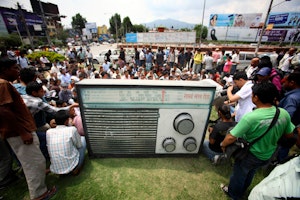Where Journalists Are Criminals
By Maureen Aung-Thwin
Aye Chan Naing is the Chief Editor of Democratic Voice of Burma (DVB), a news agency and Open Society Institute grantee that is the focus of the Academy Award–nominated documentary Burma VJ: Reporting from a Closed Country. While in the US to promote the film, Aye Chan Naing spoke with OSI about the current situation of DVB’s underground work in Burma.
What is the Democratic Voice of Burma?
Democratic Voice of Burma is an independent multimedia organization committed to responsible journalism. We provide uncensored and unbiased news and information to the people of Burma both in the diaspora and inside Burma via daily shortwave radio, satellite television programs, and our website, www.dvb.no. DVB is also the main provider of Burma-related television news to international and local television stations, journalists and filmmakers.
Although DVB was established in Oslo, Norway, in 1992, the majority of our journalists are working inside Burma as undercover reporters.
What is life like for DVB reporters working undercover?
They risk getting arrested every day. For example, they could even be questioned for covering a story on the spread of swine flu in Burma. They sleep in different places to be safe and always have to be alert, not only to pursue breaking news but also to go into hiding immediately if one of their co-workers gets arrested.
In public, our journalists have to carefully hide any equipment such as mobile phones, tape recorders, laptop computers and cameras. This kind of equipment attracts the attention of the authorities who are easily suspicious.
The most difficult decision our reporters face every day is whether to spontaneously take out their camera or microphone and start recording events and incidents, or someone speaking out in despair. This is the most painful decision they have to make, whether to report the story or leave it completely untold.
Why can't you report legally from inside Burma?
There are several laws, some dating back to 1878, which the Burmese regime uses in order to suppress free expression inside Burma. Two examples of such laws are the Vernacular Press Act which was created by the British colonial power in Burma to submit articles before publication, and the Electronic Act, a newer law which prohibits sending information "detrimental to the security of the state" across the internet. Most of our jailed journalists were charged under the Electronic Act.
But – and this is a very big but – these are not the only laws the regime uses to suppress free expression. Hla Hla Win, a DVB journalist who was recently sentenced to 20 years imprisonment had her sentence extended by seven more years (for a total of 27 years imprisonment) because she was riding a bicycle without a license.
Can you tell us more about your campaign for the detained DVB journalists who were recently imprisoned?
We refuse to be silent while the Burmese regime continues to treat our journalists as criminals. More than a dozen DVB journalists have been imprisoned since 2007. In Dec 2009, Hla Hla Win, a DVB journalist was sentenced to 27 years imprisonment and in Jan 2010, another journalist, Ngwe Soe Lin was sentenced to 13 years imprisonment. Both of them were arrested while pursuing news stories for DVB.
We have set up a “Free Burma’s VJs” campaign committee. We are also working with international associations such as Reporters Without Borders and Committee to Protect Journalists. We are also asking governments and UN agencies to demand the Burmese military release our journalists from prison. Finally, we are planning to launch a public awareness campaign to mobilize support from the international community.
Until June 2017, Maureen Aung-Thwin was special advisor to the Burma Program at the Open Society Foundations.

